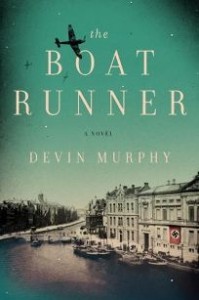 By Colorado Review Associate Editor Cory Cotten-Potter
By Colorado Review Associate Editor Cory Cotten-Potter
Devin Murphy’s debut novel, The Boat Runner, is a powerful examination of what it means to choose. Murphy has created a family on the edge of collapse, with characters facing near-impossible situations in a turbulent moral landscape which force us as readers to confront our own categorical thinking, and exchange it for insight into the particular, deeply human character that is Jacob Koopman—a young man whose first act of desire is to mend the dollhouse of his childhood crush. A young man who will go on to consciously join the German military in World War II.
Jacob Koopman grows up in the seaport of Delfzijl. His father’s factory is the town’s largest employer. It’s a lifestyle that causes the family to exist at some remove from the rest of the community. Their family life itself is quiet: his mother enjoys dancing and playing the piano; Jacob’s brother, Edwin, is a thoughtful artist; there’s even a big, dumb dog that routinely ruins the plaster walls by pushing himself around the boy’s room in his sleep. The only major source of familial conflict is the father’s ambitions to secure his family’s future—ambitions that end in a trip to Rotterdam, where he hopes to shore up his contract with Volkswagen, and instead finds himself and his boys in the middle of a German attack. During the assault, Jacob and Edwin attempt to cross the flooded streets in order to find their father—the city has opened the canals as a defensive maneuver—and Edwin falls through an unseen manhole and is swept away by the current to his death. This is merely the first catastrophe that the family suffers, and, while tragic, their situation is not the complete dehumanization faced by others.
Jacob eventually loses not only his brother, but his father as well. He goes to work on his Uncle Martin’s boat, running supplies and ferrying troops for the Germans. One night, under the guise of approaching a sandbar, Martin corrals the German soldiers into a small area near the boat’s stern and subsequently shoots them. This represents a significant turn for Jacob. Martin views this as necessary resistance, an inevitable part of the war. But the situation is more complicated for Jacob. Most of these men were his own age; one even carried the same dagger that Jacob did, a prize from the Hitler Youth camp, which he and Edwin had attended. As Jacob and Martin stand over one of the bodies, Martin says, “That’s the man that tried to take your father away . . . He’s part of the reason he’s gone. Do you get that? Do you get what they’ve done to your father?” We get the sense that Jacob does not; his feelings of blame lie elsewhere. His feelings, motivated by the loss of his brother and father and the English bombing of Delfzijl, led Jacob to choose to join the German military. Later in life, looking back on his involvement, he is overcome by guilt. However, despite the insight of old age, the true terms and consequences of his decision to join the Germans remain somewhat obscure to him.
The book is impressive in itself, but even more so when viewed from my current position at Colorado Review, where Devin Murphy also worked, and as an MFA candidate at Colorado State University, where he too received his MFA. As an emerging writer, my interests and abilities will continue to change and grow. Witnessing the literary accomplishments of an alum is an important reminder of how formative my time at the Center for Literary Publishing will be in shaping my knowledge of the publishing world and aesthetics as a writer. Creating a world that is as unflinching and earnest as the one that Murphy has created in The Boat Runner is an achievement worthy of our attention.